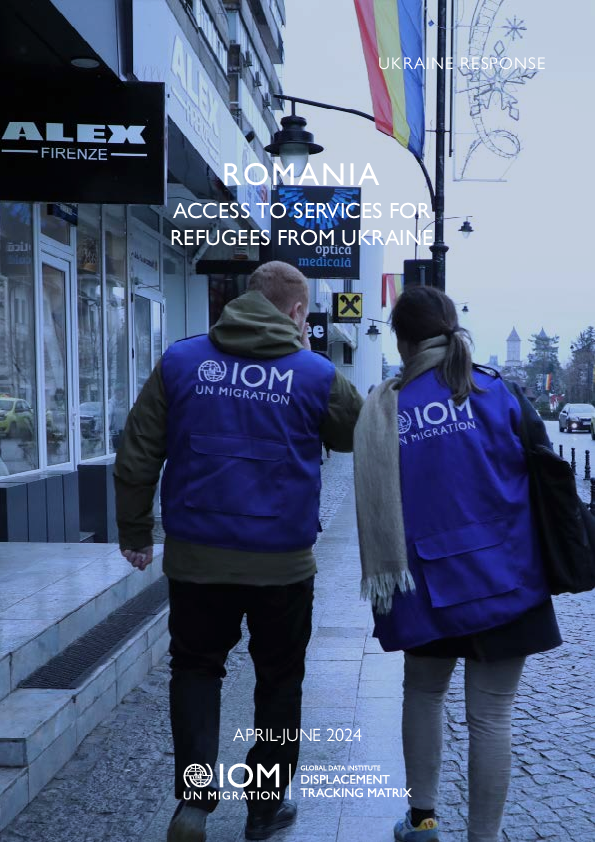-
Countries
-
Data and Analysis
-
Special Focus
-
Crisis Responses
Survey

Contact
DTM Ukraine, dtmukraine@iom.int
Language
English
Location
Ukraine
Period Covered
Jul 13 2024
Aug 12 2024
Activity
- Survey
Changes to Resolution #332, which came into effect in March 2024, introduced new criteria for eligibility, focusing on factors such as income level, employment status, and specific vulnerabilities, to refine the allocation of the IDP allowance. These changes have raised concerns about the exclusion of some vulnerable IDPs. As a result of advocacy from the humanitarian community, the CMU adopted new amendments to Resolution #332 on 22 March 2024, adding five more vulnerable groups (expanding to 15), including IDPs of pre-pension age and adults with serious medical conditions. Some of these groups had their eligibility status automatically extended, while others were asked to reapply to confirm their eligibility.
This update aims to analyse the effects of the new eligibility criteria for extension of the allowance on the IDP population by examining five key indicators related to the proportion of IDPs who reported:
- Holding of a valid IDP registration,
- Receipt of the IDP allowance prior to the amendment (from February 2022 to March 2024),
- Re-application for the allowance post-March 2024 under the new law,
- Receipt of the IDP allowance post-March 2024,
- Loss of the allowance following the amendment of Resolution #332.

Contact
DTM Europe, DTMMediterranean@iom.int
Language
English
Location
Republic of Moldova
Period Covered
Apr 01 2024
Jun 30 2024
Activity
- Survey
- Flow Monitoring
The IOM’s Displacement Tracking Matrix collected data through Surveys with Refugees in the Ukraine Response region from April to June 2024. In the Republic of Moldova, a total of 1,892 surveys were collected. This report focuses on the economic integration of the respondents, delving deeper into their employment profiles, skills, and prospects for participation in the local labour market.
Key findings:
- 81% of the respondents possessed Temporary Protection Status. Others reported having: irregular status (16%), refugee status (1%), residence permits (1%), or Moldovan citizenship (1%).
- 87% of the active respondents were employed in Ukraine before displacement. After being displaced in the Republic of Moldova employment rates were 58% among the respondents that actively participated in the labour market.
- Among employed respondents, 35% had an official working contract in the Republic of Moldova and 21% were working based on a verbal agreement. The remaining had a remote working contract in another country (36%) or preferred not to disclose their status (8%).
- Two-thirds (62%) of men and 76 per cent of women were satisfied with their working arrangement.
- Respondents reported an average monthly expenditure of 280 euro on rent and 90 on utilities.
- 53% of the surveyed households had a total monthly income of less than 400 euros.
- 72% reported receiving an average of 400 euros monthly in remittances from Ukraine.

Contact
DTM Poland IOMDTMPoland@iom.int
Language
English
Location
Poland
Period Covered
Mar 01 2023
Jan 01 2024
Activity
- Survey
In March of 2023, IOM Poland launched its Integration Survey to assess the progress and needs relating to the economic and social integration of refugees from Ukraine in Poland. The assessment aims to understand the employment, housing, finances, social connections, integration challenges, urgent needs, and vulnerabilities of refugees from Ukraine; as well as how these have changed over time. The survey includes a longitudinal component in which consenting participants are surveyed over the phone between 2 and 6 months following their initial survey.
This report provides an analysis of how respondents' situations have changed over time, focusing on various aspects of social, labour and economic integration. Initial surveys were conducted throughout the spring and summer of 2023, and follow up surveys between the summer and winter of 2023-2024. A total of 160 respondents participated in the longitudinal component.
In September 2024, the DTM teams in Malawi, Mozambique, Zambia, and Zimbabwe implemented the first phase of a regional assessment as part of Southern Africa regional response to areas affected by the El Niño-induced drought. This initial phase focuses on identifying districts experiencing population movements (arrivals, departures, and returns) due to drought in the four countries. DTM Southern Africa regional assessment aims to provide more detailed information on the number, locations and needs of vulnerable families forced into displacement by climatic and environmental factors.

Contact
IOM Sierra Leone
Language
English
Location
Sierra Leone
Period Covered
Jun 01 2023
Oct 02 2023
Activity
- Survey
Survey on Profiled Return Migrants

Contact
DTM Europe, DTMMediterranean@iom.int
Language
English
Location
Romania
Period Covered
Apr 01 2024
Jun 30 2024
Activity
- Survey
- Flow Monitoring
IOM’s Displacement Tracking Matrix (DTM) collected data on the needs, intentions, and integration challenges of refugees as part of the Surveys with Refugees in the Ukraine Response Region exercise. From April to June 2024 (Q2), DTM interviewed a total of 248 individuals in Romania. This report presents the findings on access to services that facilitate integration, and needs and assistance.
Key findings:
- Migration status
- 92% EU Temporary protection status
- 8% Other Active population:
- Household (HH) composition
- At least 2 adults and 1 child – 35%
- A single adult and at least 1 child – 19%
- Alone –19%
- At least two adults and no children – 24%
- Other – 3%
- Children
- 69 % - children aged between 5 and 17 years old
- 31% - infants aged between 0 and 4 years old
- Needs
- Financial support (68%)
- Food supply (59%)
- Sanitary products (58%)
- Health services (33%)
- Education for adults (24%)
- Obstacles in accessing healthcare
- Language barrier (28%)
- Cost (23%)
- Long queues (6%)
- Ease of visiting a doctor
- Very difficult (8%)
- Somewhat difficult (27%)
- Neither easy, nor difficult (21%)
- Somewhat easy (13%)
- Very easy (<1%)
- Unknown (33%)

Contact
DTM Burundi, DTMBurundi@iom.int
Language
English
Location
Burundi
Period Covered
Dec 11 2023
Apr 29 2024
Activity
- Survey
- Community Perception
Ce rapport présente les cartes de niveau colline créées sur la base de l'exercice de cartographie participative des incidents et des solutions liées aux phénomènes climatiques. Au cours de l'exercice de cartographie participative, les enquêteurs ont cartographié 2 520 dommages et 2 311 solutions.
Entre juin 2022 et juin 2024, la Matrice de Suivi des Déplacements (Displacement Tracking Matrix, DTM en anglais) de l’Organisation internationale pour les migrations (OIM) et le Joint IDP Profiling Service (JIPS) a mis en oeuvre et contrôlent le projet financé par ECHO : Dégradation de l’environnement et déplacements : utiliser les données centrées sur les citoyens pour améliorer la programmation humanitaire. Au cours du projet, deux cycles de collecte de données ont été réalisés. Le premier a eu lieu entre le 11 et le 22 décembre 2023 et le second entre le 4 et le 29 avril 2024 dans 6 communes (65 Collines) à travers quatres provinces du Burundi.
Les résultats présentés ici ont été recueillis à l'aide de l'approche d'intelligence collective créée au cours du projet. Pour en savoir plus sur cette approche, consultez l'étude de cas du projet : 'L'utilisation des Méthodes d'Intelligence Collective : Cartographie participative et données générées par les citoyens pour lutter contre la dégradation de l'environnement et les déplacements de population'.
Si vous avez eu l'occasion de lire ou d'utiliser ce rapport, nous vous invitons à répondre à une courte enquête en français (lien ici) ou en anglais (lien ici). Nous apprécions beaucoup votre retour d'information.
Pour obtenir l'accès, veuillez cliquer sur le bouton « Request Access ».

Contact
DTMEthiopia@iom.int
Language
English
Location
Ethiopia
Period Covered
Jan 01 2023
Dec 31 2023
Activity
- Other
- Survey
Following the release of the first edition of PROGRESS 2023 report, the Displacement Tracking Matrix (DTM) carried out focus group discussions to understand the nuances of the effects of displacement from the perspectives of individuals who were displaced, had returned or were part of non-displaced communities which hosted IDPs. The focus group discussions served as a forum to share viewpoints that are not often captured by traditional data collection exercises, including affected communities' perceptions of cultural and gendered effects of displacement in their communities. The discussions were conducted in local languages and translated by IOM DTM staff.
This report presents a deeper country-specific dive into the findings of the qualitative analysis of six focus group discussions conducted between 1 and 15 August 2023 in South West Ethiopia People’s region and Afar region with 59 representatives from the IDP, returning IDP and non-displaced resident communities. Sixty per cent of respondents were male and the remaining 40 per cent were female. Seventy-three per cent of respondents were between the ages of 18 and 59, the remaining 22 per cent were older than 60 years, and 5 per cent were youth.

Contact
DTMEthiopia@iom.int
Language
English
Location
Ethiopia
Period Covered
Jan 01 2023
Dec 31 2023
Activity
- Survey
Following the release of the first edition of PROGRESS 2023 report, the Displacement Tracking Matrix (DTM) has compiled a series of National Displacement Profiles based on end of year 2023 figures. These profiles offer insights into the latest end-of-year 2023 figures, aligning with the objectives outlined by the Data for Solutions to Internal Displacement Taskforce (DSID).
The profile provides a comprehensive overview of the demographic breakdowns and geographical distribution of internally displaced persons (IDPs) in Ethiopia as of the end of 2023. It delves into the primary areas of origin and displacement for IDPs, shedding light on the factors influencing their decision-making processes regarding the selection of solutions locations.
This compilation underscores the critical role of data in addressing internal displacement challenges and highlights the ongoing efforts to leverage data-driven solutions through collaborative initiatives like DSID.

Contact
DTM Burundi, DTMBurundi@iom.int
Language
English
Location
Burundi
Period Covered
Dec 11 2023
Apr 29 2024
Activity
- Survey
- Community Perception
Entre juin 2022 et juin 2024, la Matrice de Suivi des Déplacements (Displacement Tracking Matrix, DTM en anglais) de l’Organisation internationale pour les migrations (OIM) et le Joint IDP Profiling Service (JIPS) a mis en oeuvre et contrôlent le projet financé par ECHO : Dégradation de l’environnement et déplacements : utiliser les données centrées sur les citoyens pour améliorer la programmation humanitaire. Au cours du projet, deux cycles de collecte de données ont été réalisés. Le premier a eu lieu entre le 11 et le 22 décembre 2023 et le second
entre le 4 et le 29 avril 2024 dans 6 communes (65 Collines) à travers 4 provinces du Burundi. Ce rapport présente un résumé des données
collectées dans les 65 collines, en indiquant le sexe et l’âge des répondants ainsi que les catégories de vulnérabilité dans chaque colline. Le rapport décrit une analyse des risques, des conséquences, des facteurs contributifs et des solutions au niveau des collines.
Les résultats présentés ici ont été recueillis à l'aide de l'approche d'intelligence collective créée au cours du projet. Pour en savoir plus sur cette approche, consultez l'étude de cas du projet : 'L'utilisation des Méthodes d'Intelligence Collective : Cartographie participative et données générées par les citoyens pour lutter contre la dégradation de l'environnement et les déplacements de population'.
Si vous avez eu l'occasion de lire ou d'utiliser ce rapport, nous vous invitons à répondre à une courte enquête en français (lien ici) ou en anglais (lien ici). Nous apprécions beaucoup votre retour d'information.
Pagination
- Previous page
- Page 8
- Next page

